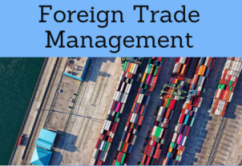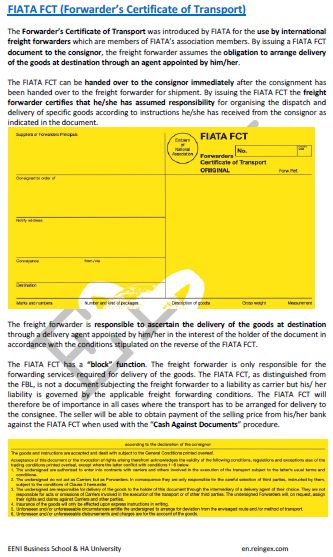Forwarders Certificate of Transport (FIATA FCT)

FIATA Document FCT: Forwarders Certificate of Transport (to order of)
- The Forwarders Certificate of Transport (FIATA FCT) of the FIATA
- Features of the Forwarders Certificate of Transport (FIATA FCT)

The Subject “Forwarders Certificate of Transport (FIATA FCT)” belongs to the following Online Programs taught by EENI Global Business School:
Courses: Export Assistant, Foreign Trade Management.

Logistics Courses: International Transport, Maritime Transport, Multimodal, Road, Transport in Africa.

Diplomas: Foreign Trade, International Transport.

Masters: International Transport, Transport in Africa, International Business, Foreign Trade.
Doctorate: Global Logistics, World Trade.
Languages: 
 Certificado de Transporte del Transitario (FIATA FCT)
Certificado de Transporte del Transitario (FIATA FCT)  Certificat de transport du transitaire (FIATA FCT)
Certificat de transport du transitaire (FIATA FCT)  Certificado de Transporte do Transitário (FIATA FCT).
Certificado de Transporte do Transitário (FIATA FCT).

Sample - Forwarders Certificate of Transport (FIATA FCT):

When a freight forwarder issues a Forwarders Certificate of Transport (FIATA FCT) document on behalf of the consignor, he is assuming the obligation to organize the shipment of the products to a destination through an agent designated by him.
- The freight forwarder is only responsible for the shipping services necessary for the delivery of the goods
- The Forwarders Certificate of Transport (FIATA FCT) is negotiable when it is specified that it is “to order of” (defined by the International Chamber of Commerce)
- The FCT is admitted in documentary credits
- When an FCT is issued, the freight forwarder must ensure that the goods appear to be in apparent good condition
- When preparing a Forwarders Certificate of Transport, it must be filled in a very meticulous way, since the data contained in the document must accurately reflect the complete details of the shipment
- The Forwarders Certificate of Transport (FIATA FCT) is issued by the freight forwarder, thus formalizing the transportation contract
- Agent issuing the Transport Certificate of the Freight Forwarder: international freight forwarders members of the FIATA
- Recommended Incoterm: CIF (Cost, Insurance and Freight)
- Color of the Forwarders Certificate of Transport: yellow
- Date of creation of the Forwarders Certificate of Transport: 1995
- The Forwarders Certificate of Transport is regulated by the Geneva Convention
- Name in Spanish: Certificado de Transporte del Transitario (FIATA FCT)
FIATA Documents:
- Negotiable Combined Transport Bill of Lading (FBL)
- FIATA Multimodal Waybill FWB
- Forwarders Certificate of Receipt (FIATA FCR)
- Warehouse Receipt
- Electronic FIATA Bill of Lading
Source: FIATA
Trade Facilitation - Trade Facilitation Agreement - Kyoto Convention - Convention Harmonization of Frontier Controls of Goods.
(c) EENI Global Business School (1995-2024)
We do not use cookies
Top of this page



